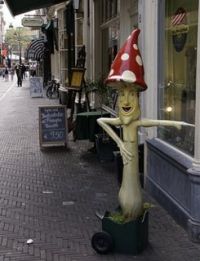Why, this sounds absolutely delectable, in a kind of horrifying, clawing-your-eyeballs-out-with-a-shrimp-fork kind of fashion:
A new drink is rising up in the bars of LA, Tequila Espresso. Served over ice and in a rocks glass, it’s an interesting alternative for anyone looking for the simultaneous caffeine and alcohol buzz. As for the origins of the drink, the farthest back we can trace it is to a rather mischievous bartender at the Chateau Marmont, where many a great thing has begun and ended.
Directions are simple: Pour your choice of tequila over ice, pull a fresh espresso, and pour the espresso into the glass.
As if that's not ba-- er, delicious enough, "Patron has even come out with an espresso flavored Tequila as well." May God have mercy...
I finally got a chance to read the big ayahuasca article in the LA Times this weekend and found it to be pretty decent. This is probaby the best article on ayahuasca I have seen in the mainstream press, even though you have to log-in to read it (use bugmenot.com to get a valid password). It is so long I can't quote much of the text here, but I will include one bit with some commentary:
New York writer Daniel Pinchbeck brought ayahuasca to the attention of liberal thinkers, detailing his mind-blowing journeys with the brew (and numerous other hallucinogens) in a pair of books: 2002’s “Breaking Open the Head: A Psychedelic Journey Into the Heart of Contemporary Shamanism” and 2006’s “2012: The Return of Quetzalcoatl.” “When I published my first book in 2002 and I spoke to audiences, 50% to 80% of the people hadn’t heard of ayahuasca,” Pinchbeck says. “Now everywhere I go, everyone is familiar with it.”
The article contends that ayahuasca has gone mainstream, but has it? I don't think so. Although the people who show up to listen to Daniel Pinchbeck have probably heard of it, the general public is still totally unaware. I think many of them know there is a jungle brew that makes you see visions, but "ayahuasca" or "DMT" are certainly not household words, even though the Supreme Court has arugued the religious merits of the ayahuasca ritual and given it a thumbs up. Maybe if Daniel Pinchbeck could make a guest appearance on "Heroes" or "30 Rock" and introduce ayahuasca to the non-intellectual elite via something that will be re-run forever in syndication, then we could officially add "ayahuasca" to the cultural lexicon. But for now most people are still in the dark.
And, to be honest, I am a little scared of ayahuasca going "mainstream" and having the public embrace it as the cool new thing. Celebrity shamen will be the new gurus. New Age celebs will discuss how they "got it" on daytime talk shows. Those who have the experience under their belt will consider themselves "Star-Bellied Sneeches," better than the rest. Culture wars will ensue; ancient patches of vine in the Amazon will be ripped apart; the hoasca hippies will all move on to cocaine and smack; cult gurus will be caught in sexual assault scandals; college kids will be chugging dorm-brew in "huasca bongs"; Erowid trip report vaults will explode with people talking about the inter-connectedness of all things... Oh the horror.
by Erik Davis I've been going through my old writings on Philip K. Dick lately, preparing for a larger project. I dug up this old review for the Village Voice's VLS that I did in 1989, a year out of college, where I wrote my senior thesis on Dick. I don't agree with all of it now, but it holds up, and I am not so often ahead of the curve.When Philip K. Dick died after a stroke in 1982, he left behind almost forty science fiction novels, over a hundred short stories, a few remarkable essays, and the “Exegesis,” a crazed document that attempted to interpret the divine intelligence that he claimed invaded his mind in 1974. Thought Dick remains partially buried in the mildewed heap of yesterday’s pop trash (best known as “the guy who wrote the book they based Blade Runner on”), his dedicated following has grown since his death. Some of his best books are out of print in the States, but a steady trickle of unpublished (and mostly non-SF) work has been released in the last few years. Whether or not Dick hacked out the most brilliant American science fiction ever is debatable; that his work remains the most brilliantly fucked-up SF is beyond doubt.
Though he uses generic devices like androids, spaceships, Martians, and moon colonies, Dick’s worlds are usually bummers just around the corner, near-futures characterized by rampant overpopulation, surveillance, urban decay, repressive state apparatuses, ubiquitous ads, and invasive technology. As far back as the ‘50s, Dick saw the dark, paranoid side of McLuhan’s global village. The animism that primitive humankind projected onto Nature was for him reborn in our technological environment, where ominous spiritual forces merged with the instruments of late capitalism. Dick’s machines are black jokes rather than believable imaginings: the portable computerized psychiatrist, Dr. Smile, in The Three Stigmata of Palmer Eldritch; the empathy machine in “The Little Black Box,” which fuses the users’ consciousness with a televised savior; The Divine Invasion’s holographic multicolored Bible.
Driven by what he called “divine discontent,” Dick howled in his dystopic wilderness against the powers that be. His characters are ordinary schlemiels, bumbling Joes and Janes struggling with small moral dilemmas, poverty, politics, and psychic breakdowns in worlds where entropy reigns and communication breakdowns are inevitable. Unlike Pynchon—whose obsessions resemble his in many ways—Dick maintained little ironic distance from his characters, and his empathy for them and their hopeless struggles is palpable as well as odd. Not that Dick didn’t undercut the pathos with comic gags. In A Scanner Darkly, Charles Freck tries to kill himself by consuming wine and a handful of reds: “However, he had been burned. The capsules were not barbiturates, as represented. They were some kind of kinky psychedelics…Well, he thought philosophically, this is the story of my life. Always ripped off…The next thing he knew, a creature from between dimensions was standing beside his bed looking down on him disapprovingly.”
Dick’s characters battle not only themselves, but also the second law of thermodynamics. Entropy is a major trope in SF, but in Dick’s hands it’s a dark god. Do Androids Dream of Electric Sheep? features the semi-retarded Jack Isidore living alone in this deteriorating, blind building of a thousand uninhabited apartments, which like all its counterparts, fell, day by day, into greater entropic ruin. Eventually everything within the building would merge, would be faceless and identical…buried under the ubiquity of the dust. By then, naturally, he himself would be dead, another interesting event to anticipate as he stood here alone with the lungless, penetrating, masterful world-silence…Better, perhaps, to turn the TV back on.
This move towards the TV was characteristic, because Dick was obsessed with communications technology—radio, records, tapes, television, phones, computers—using it as a metaphor for the social web people build from their individual signals to keep entropy at bay. Technology only reinscribed for Dick the signals, noise, distortion, and overlapping frequencies that we are already simultaneously trapped in and estranged from. He usually wrote in the subjective third person, jumping among the variable perspectives of the characters that made up his narratives. By switching viewpoints, Dick formalized and toyed with his contention that objective reality is both synthetic and fragile, a “hypothetical universalization of a multitude of subjective realities.” Most of his tales contain false worlds, spurious environments simulated and controlled by nefarious powers using drugs, technology, and psychic power. In The Three Stigmata of Palmer Eldritch, the eponymous figures returns from space and markets Chew-Z, a drug which projects users into a world he controls. As Dick’s creations discover off-kilter clues in their environment, their paranoia and sense of irreality grow, until their suspicions are not only fulfilled but often grossly exceeded. Dick was a narrative trickster, a master mindfucker. He pulled the whodunit inside out: Decoding small meaningful details doesn’t put the picture together so much as rip it apart. By twisting the page-turning groove of pulp into a Möbius strip, Dick attempted to undermine the political, social, technological, and psychic structures of “reality.” He wanted a pulp guerilla ontology that deconstructed everyone’s power trip—Nixon’s, IBM’s, God’s, the author’s. Dick’s fully fake world appeared in Time Out of Joint (1959), which shivered with the Cold War. In it, Ragle Gumm spends his days drinking beer in ‘50s suburbia, supporting himself through his unusual skill at playing a newspaper puzzled called “Where Will the Little Green Man Be Next?” Strange slippages in normal reality occur—he finds a phone book with unfamiliar exchanges, picks up unlisted programs on his ham radio—and Gumm becomes increasingly paranoid, convinced his world is spurious. We eventually find out that it’s 1996, the Earth is at war with lunar colonists, and the puzzle takes advantage of Gumm’s uncanny ability to predict the next hostile bombing. It turns out that Gumm had become sympathetic with the colonists and refused to continue aiding Earth, so the military-industrial complex created the false environment and drugged him into useful forgetfulness. Dick engaged the mutant logic of late capitalism and the technological simulacrum before Baudrillard knew a megabyte from a baguette, coming to the conclusion that only an antagonistic relationship with reality—even to the point of madness—is sane. In a world of crystal-clear transmission, Dick tuned to the static between channels, turned up the volume, and listened for hidden messages. His skepticism constitutes an increasingly fervent metaphysics. He was obsessed with the Gnostic concept of a demiurge, a false god who obscured the true world with illusory time and space. Part of the authorial fragmentation that pervades Dick’s work arises because, though he clearly identified with his flailing characters and their metaphysical morality plays, he remained the demiurge of his own narratives. In Valis, Dick made the provocative statement that “the symbols of the divine show up in our world initially at the trash stratum.” While the fragments of schizo vision scattered through Dicks work may not have been holy, he certainly got the trash part right. By almost every conventional standard of literary quality, Philip K. Dick was a hack. Most of his work is clunky, uneven, and occasionally awful. Having first published SF in 1951, he never lost touch with the gaudy mechanics of earlier SF pulpsters like A.E. van Vogt. Though one develops an affection for his characters, their dialogue is sometimes forced and obvious. Both the science and the plots strain credulity. The hasty feel of many of his books is no accident. Driven by poverty, obsession, and frequently by amphetamines, he wrote like the madman he probably was. In 1965, he published four novels; two a year, plus numerous short stories, was his standard rate. Dick’s schizophrenic quality turns him into many authors: a poor man’s Pynchon, an oracular postmodern, a rich product of the changing counterculture, a lunatic. As Thomas Disch said, he was a “science fiction writer’s science fiction writer,” respected in the SF community even though his U.S. sales were mostly mediocre (he was much more popular in Britain and France). He’s a particular favorite among scuzzy underground rock bands like Sonic Youth and the Reverb Motherfuckers, as well as scuzzy underground rock critics like Byron Coley. Diehards chronicle and compare his every word and deed, blurring the distinction between literary love and cult. And some academics of the leftist post-structuralist bent, most notably Fredric Jameson, love his political met fictions, his gaudy feel for the process of reification, his hack Kafka humor. On the other hand, Harold Bloom—an eternal advocate of imagination over reality—finds Dick vastly overrated, but that’s probably because, as anyone who’s read Bloom’s Flight to Lucifer knows, Dick can write Gnostic science fiction and Bloom can’t. Part of the appeal of Dick’s oeuvre is that, despite its futuristic setting and outlands events, it functions as autobiography. Most of the recent reissues of his novels feature his bearded visage on the cover, in part because his fans recognize that the real subject of his texts was his own frail, intense, and fragmented self. Because he didn’t distance himself from his novels, they read as both Freudian confessions and Jungian dream journals. Dick himself had numerous wives and young girlfriends, and the relationships he described are invariably screwed up, sad affairs of misunderstandings, adulteries, and recriminations. But Dick’s psychological obsessions go beyond the erotic and personal into the archetypal. Patterns and motifs reappear throughout his novels with the archaic and gaudy power of symbols: broken pots, the Black Iron Prison, policemen, toys, jewelry, books that are read randomly (based on the I Ching), miniature figures, simulacra. These two confessional aspects of Dick are well represented in The Dark Haired Girl, a collection of letters and dreams about the teenage girls he was obsessed with. One letter will sound depressingly naïve and pathetically sentimental; the next will describe some fascinating overloaded dream, then and equally strange interpretation of the symbolism involved. Dick’s most overblown reading of an event occurred in 1974, when the sight of a delivery woman’s Christian fish necklace triggered his psychic contact with the “divine intelligence” he sometimes called VALIS, of Vast Active Living Intelligence System. Among other things, he communicated with a persecuted Christian living in ancient Rome, who warned him through a Beatles songs that his son Christopher would die unless he was taken to a hospital. Dick also became convinced that the universe was a hologram and that VALIS was a camouflaged parasite that entered human beings through subliminal messages. The information lurked everywhere, especially in trashy artifacts of pop culture, so that in the end Dick must have believed himself to be less a writer than a pulp contagion, a pirate transmitter in a world jammed with increasingly vivid and increasingly delirious signals.
 |
Here's an excellent mix that came across my inbox recently, well worth wading through the pop-up ads on the zshare site to get this download:
Celery Moon likes to spend time eating cakes and sandwiches in New York City and has an interest in fashion, illustration and music. This mix was made in honor of the New Year and living a fun life no matter what. Keep an eye or ear open for deejay appearances this year.
00 Celery Moon - Good Morning Stardust • 72 Minutes 52 Seconds
01 As One - Rumours • Versatile
02 Digitalism - Pogo (Digitalism Remix) • Kitsune Maison
03 John Dahlback - Blink (Dum Chris Remix) • Paradise
04 Gui Borrato - Beautiful Life (Sascha Funke Remix) • Kompakt
05 Switch - A Bit Patchy (Eric Prydz Remix) • Data
06 Bob Sinclar - Visions Of Paradise • Yellow Productions
07 Paul Johnson - Hot (Nicolas Vallee Remix) • Black Jack
08 Sugababes - Easy (Seamus Haji & Paul Emanuel Remix) • Island
09 Sesa - Like This Like That (Sinden & Count of Monte Cristal Remix) • 541
10 MegaDynasty4 - Kiss The Ring • Offshore Recordings
11 Sascha Funke - When Will I Be Famous • Bpitch Control
12 Filth N Dirt - Go Ahead • Citizen
13 Felix Da Housecat - Like Something For Porno (Teenage Badgirl Remix) • Different
14 Da Funk - Her Digits • Acryl
15 Scissor Sisters - I Don't Feel Like Dancing (Linus Loves Dub) • Polydor
16 Swen Weber - First Stroke • Vendetta
17 Kanye West - Stronger (Tiny Edit) • Dub
18 Z1 - Electro Clash • Robots
19 Burial - Archangel (Leif Remix) • White
20 Lifelike - Discomachine • Different
21 Robyn - With Every Heartbeat (Kleerup Remix) • Konichiwa
22 Autokratz - It's On • Kitsune Maison
23 The Spirals - Permission To Fly • Darkroom Dubs
24 Q Lazarus - Goodbye Horses (Krikor Edit) • DIRTY
25 I:Cube - Prophetization • Versatile
26 Stateless - Bloodstream (Pilooski Remix) • K7
27 So Inagawa - Untitled • Dub
28 Ellen Allien - Ghost Train • Bpitch Control
From a transcript of Bill O'Reilly:
O'REILLY: Now, let's get to another topic, which is interesting and in the news. It seems that the Hollywood community has rallied around the late Heath Ledger, and they told Paramount, which runs "Entertainment Tonight" and "The Insider," two gossip shows, you better not run the video taken of Ledger at an alleged drug party a couple of years ago. And if you do, you know, you're going to be in a lot of trouble with the Hollywood community. Therefore, the two celebrity shows, "ET" and "The Insider," said, OK, we won't run it, after paying $200,000 for it.
What do you think about that? No. 1, Hollywood very rarely does stuff like that. And is that a cause to rally to? They say they don't want the Ledger family to be hurt.
INGRAHAM: Sounds something like that the Tattaglia family would do in, like, "Godfather 2." I mean, it's just like strong-arm tactics.
O'REILLY: They're strong-arm.
INGRAHAM: ...establishment. And to me, you know, Bill, I don't like any of these stories. I don't like talking about them, and I don't like the coverage of them. I think we do too much of it.
However, it's a little late for Hollywood to express this selective moral indignation: "Oh, you can't run this video." And I think part of it, Bill, is that they don't want people to get a bird's-eye view of what goes on in places like the Chateau Marmont in L.A., where you know...
O'REILLY: I think there's some truth to that, because they — it's in...
INGRAHAM: Coke party central.
O'REILLY: There are so many illegal drugs surrounding the entertainment community, and you very rarely ever hear of any arrests. I think they're protecting these people. And they have, like, 15 guards and all of that.
But here is the deal that disturbs me. I think that the death of Heath Ledger or Jimi Hendrix or Janis Joplin, these people, sends a message to people. It certainly sent a message to me when I was a kid, all right? When I saw these guys dropping in the '60s, one after another after another from drug use, I said, you know, "I'm not going to bother with that." I wasn't inclined to do it anyway. But it just reinforced that inclination.
And I think that when these people go from the drug overdoses or something, it's worthy to tell young Americans, "Hey, look at this. Look at this guy. Thought he was invincible? Boom!" Isn't that worthy?
INGRAHAM: Now don't you think the Lindsay and Britney coverage...
 |
After the melatonin post, and a few conversations I had in Buenos Aires, I thought the good readers of DoseNation might be an appropriate audience for some tips on doing drugs in foreign countries. Sure, it seems like common sense stuff, but how many times have any of us had some tripping friend walk up to them with a sketchtacular new haircut and ask, "Do I look pretty???"
1. If you are going to travel with drugs, even OTC, read up on the country's drug policy before you pack.
Even though it seems like we are the ones that live in a fascist police state, some people really do! the last thing you need on your maxin' and relaxin' international vacation is to be thrown in jail, and potentially have your hand cut off. Also, many of the places that have reputations for being wacky drug dens are also the most strict about their policies. See: Thailand.
2. If you are going to do any mind altering substance - even cold medicine - in a country where you do not speak the language, make sure you are with somebody that does.
Three days after I arrived in Argentina, I came down with some evil upper respiratory plague. Encouraged by my cursory understanding of Italian-sounding Castillian Spanish to that point, I thought I was
totally capable of going to the drug store by myself to get cough drops while on Mucinex. You know what looks a lot like cough drops and is kept in the same section? Laxatives.
3. If you are out in public, maintain. If you can not, GO HOME.
This is true everywhere, but doubly so in a foreign place. I'm a firm believer in adventure tripping. Psychedelics are kind of wasted if you're just going to sit in your living room and not see or do anything new. That said, in a foreign country, you already stand out like a sore thumb. Even if you think you don't. And if you're American, everybody already assumes that you are an asshole, to boot. If you are a high American, and you are acting like a high American, people will not have any patience for your sorry ass. Some people will just give you stink eye, but some people will have no qualms about kicking your ass. Others will think you might rob their boats, and half-threaten you with stories about swat teams descending on their tiny island hotel to apprehend theives. No lie.
4. Talk less.
Personally, this is another one I think is true everywhere, but unfortunately not everybody agrees. Again, this is more true if you don't speak the language, but even if you do, the first obvious sign that a person is high (unless they're so bombed that they're nodding out), is that they won't shut the fuck up. The less you talk, the more likely you are to not attract notice. And you'll have the added bonus of potentially experiencing and enjoying your trip more, and not annoying the shit out of the people around you. Obviously, there are exceptions to this. Some people thrive on spastic cracked out chatter, and that's how they bond. If you're with somebody that is up for that, by all means, tell them about your childhood artistic ventures and theories about politics. But if you are surrounded by sober people, and you don't want to attract too much attention, remember that the more you talk, the more obvious it is that you are high.
The Chicago folk-rock band H.P. Lovecraft took its name from a gothic fantasy/horror writer from the early 20th century. The band was founded by two very different musicians - guitarist and singer George Edwards, who gained his musical experience in the Chicago folk and blues circle, and Dave Michaels, a classically-trained keyboard player and singer.
The track featured here comes from the band's 1968 second album (under the simple title "H.P. Lovecraft II"), but quite recently both albums have been reissued as a single title - "Dreams in the Witch House - the Complete Philips Recordings". I chose it because it's certainly far from being a "song". But listen and judge it yourselves.
Here's an amazing episode of a British comedy program from 1997 called Brass Eye, devoted to the topic of "Drugs." It's set in the style of a shrill nightly newscast, and the satire is screamingly funny - from the institute where kids are deliberately dosed for years in order to make sure they're bored of drugs by the time they're adults, to the frenzied spread of a drug called "cake" that is, essentially, urinal cakes, the pitch of this comedy is intensely delicious. Upright Citizens Brigade would eventually do something very similar with their second season episode "Supercool," showing America in the grip of a pixie stick addiction, but the Brass Eye take on the concept is sharper, meaner, and much more crazed and over the top. (Sadly, Brass Eye was apparently yanked when they attempted to satirize society's response to pedophilia - oops!)
Via MilkandCookies.
 |
A recent post on the Drug Policy Alliance blog pointed us to a November 2007 article in Reason Magazine on the topic of "neoprohibition" - the creeping return of prohibition under the cover of various guises and excuses. It's a little bit chilling, and well worth the read:
On a May night in 2005, Debra Bolton, a lawyer and single mom from the Washington suburb of Alexandria, Virginia, was leaving the Café Milano in Georgetown after socializing with some friends. She had driven her SUV only a few hundred yards before she was pulled over by D.C. police for driving with the headlights off. She told the officer the parking attendant at Café Milano probably had turned off her vehicle's automatic light feature.
Not mollified, the officer asked Bolton to step out of the car, walk in a straight line, recite the alphabet, stand on one foot, and count to 30. He checked her eyes for suspicious jerkiness and insisted on a breath test for alcohol.
The breath test revealed that Bolton's blood alcohol content (BAC) was 0.03 percent, a level a 120-pound woman could expect after drinking one glass of wine. It was well below the 0.08 percent limit that marks a driver as legally intoxicated in D.C. It was not low enough for the arresting officer, however. This middle-aged mother of two, who hadn't drunk to excess, who hadn't run a red light or run a stop, was arrested, handcuffed, and fingerprinted for an innocent mistake. She sat in a jail cell for hours and was finally released at 4:30 a.m. Bolton spent four court appearances and over $2,000 fighting a $400 ticket. She then spent a month fighting to get her license back after refusing to submit to the 12-week alcohol counseling program.
The arresting officer, inaptly named Dennis Fair, insists: "If you get behind the wheel of a car with any measurable amount of alcohol, you will be dealt with in D.C. We have zero tolerance....Anything above 0.01, we can arrest." Fair recognized that nearly everyone in D.C. was unaware of this zero tolerance policy. Still, he told The Washington Post, if "you don't know about it, then you're a victim of your own ignorance."
|

Recently @ DoseNation
|
|
















